Had it been planned, it would have been less satisfying. That it was happenstance — an unforeseeable alignment of timing, location and luck — made it all the better.
I was in Tbilisi, Georgia, last month for only 48 hours, a break between meetings in Hong Kong and Marrakech, Morocco. A waitress at a Georgian restaurant near my apartment in New York had given me a list of things to see and do — primarily churches and streets to wander in the old town but also the Unesco World Heritage Site and former capital, Mtskheta, about 30 minutes outside the city.
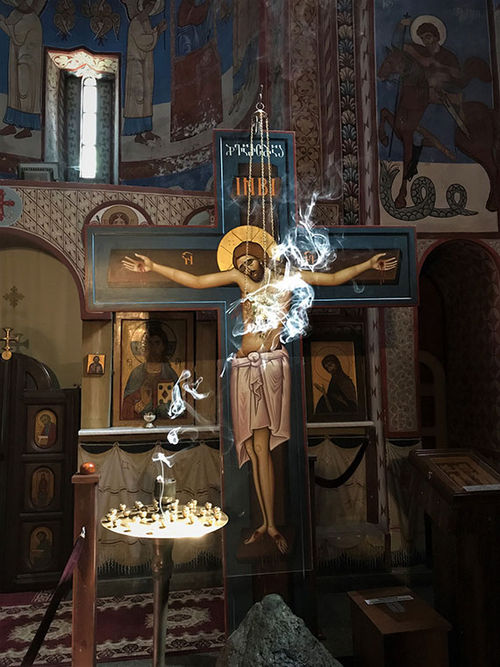
Smoke from devotional candles rises in the sunlight in Norashen Surb Astvatsatsin Church in Tblisi’s old city. Photo Credit: TW photo by Arnie Weissmann
When I checked in at my hotel, I had asked about booking a car and driver who could take me to Mtskheta for a few hours the next morning. The concierge made a call and gave me a price but warned that the driver didn’t speak English.
She later approached me in the lobby. Would I also like an English-speaking guide, at no additional cost?
Why not?
The guide turned out to be the driver’s 18-year-old nephew, who was hoping to practice his English. He was near-fluent and quite knowledgeable about the site.
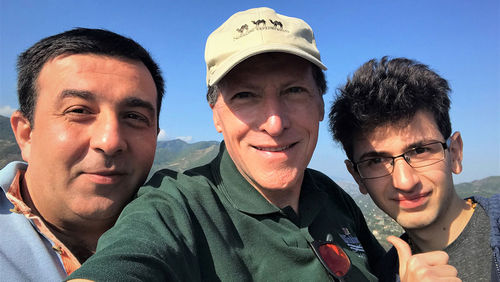
A selfie in Mtskheta with the driver, Dowid Kenkebashvili, left, and guide Tornike Kenkebashvili, right. Photo Credit: TW photo by Arnie Weissmann
As we were returning to Tbilisi, the driver asked if I had plans for the afternoon. Nothing firm, I replied. Would I like to come over to his father’s house to assist in crushing grapes for wine and eat some barbecue?
Absolutely.
We drove to a part of town decidedly less charming than the city’s center and pulled up to a nondescript house. We parked behind a midsize truck just as its driver was raising the cargo door. Inside the truck were large plastic bags, each holding about 65 pounds of rkatsiteli grapes, mostly green but with prominent purple patches on the skin.
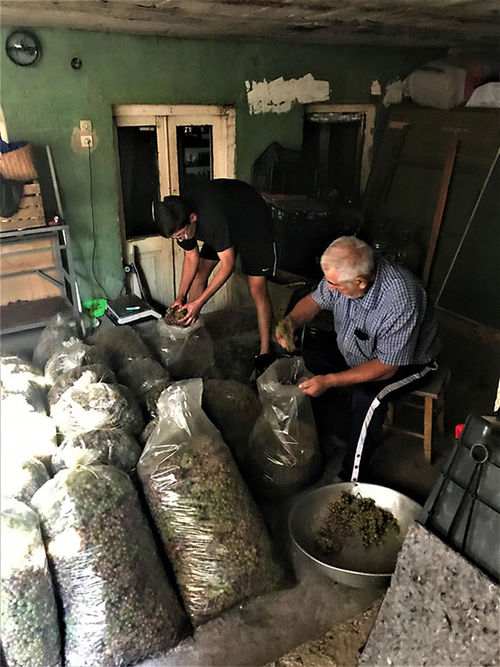
Alex Kenkebashvili, left, helps his grandfather, Tamaz Kenkebashvili, separate grapes for washing. Photo Credit: TW photo by Arnie Weissmann
We unloaded about 3,300 pounds and put them on a plastic sheet laid over a concrete patio just inside the gate. How much wine would it make? “About 800 liters,” the uncle said. Would the wine be sold? He looked surprised at the question. “No, it’s just for the family.”
It took only about two and a half hours for the assembled group, which expanded to include the uncle’s brother and his two sons plus a few friends, to crush the grapes using a hand-cranked press set over large plastic barrels.
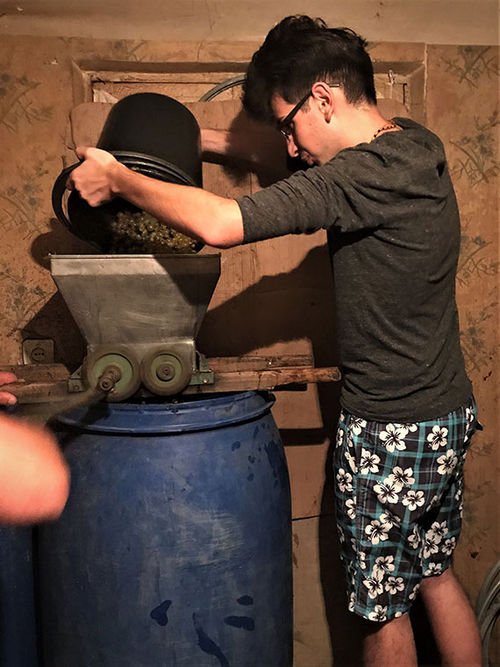
Tornike loads grapes into the hand-crank crusher. Photo Credit: TW photo by Arnie Weissmann
As we worked, we drank water glass-size portions of last year’s vintage. It was a shade of orange I had never associated with wine.
“Is it red or white?” I asked. Again, the uncle looked surprised. “It’s white.”
Perhaps orange is the new white.
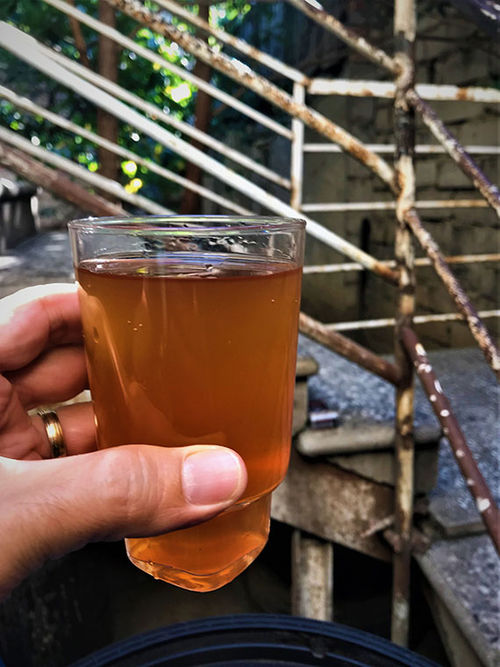
A new shade of wine. Photo Credit: TW photo by Arnie Weissmann
I’m not sure I have the vocabulary to describe its taste, but I’ll try: Fruit forward. Notes of plum, pomegranate and yellow gummy bears.
“Sweet for sweet dreams,” is how the uncle described it.
The group could not have been friendlier. This was a once-a-year activity, and it ended with a celebratory barbecue of pork skewers set over a fire pit, a salad of tomatoes and onions, home-jarred peppers and free-flowing orange wine.
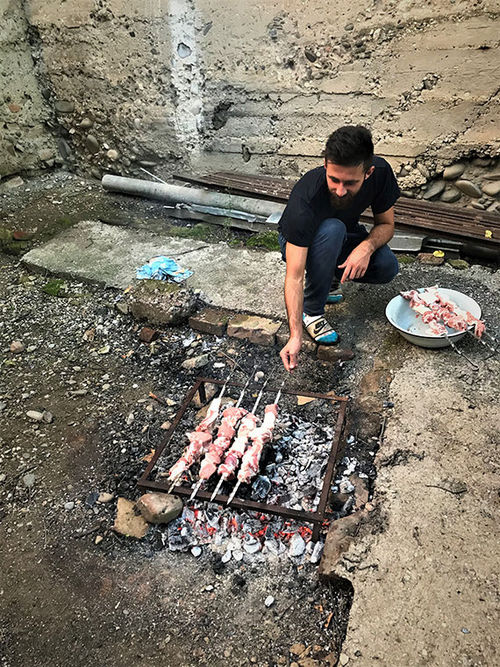
Tamaz Kenkebashvili (with the same name as his grandfather) tends to pork skewers over a charcoal pit. Photo Credit: TW photo by Arnie Weissmann
The patriarch initiated what would be a long round of toasts, blessing all who helped.
When it was my turn, I raised my glass and thanked them effusively for inviting me to join them, saying that I had come prepared to enjoy Georgian culture, wine and food but had not imagined participating in such a warm and personal experience.
Airbnb (among other travel companies) explicitly promises travelers it can assist them to “live like a local” through its Experiences offering. Had I, through serendipity, accomplished it on my own?
No. Not even close. I did get to see a part of town I might not have otherwise, and I had a great experience, the authenticity of which could have been compromised only by my presence.
In response to a column I wrote recently about the difficulty in truly connecting to a host culture, Ed Schreiber of Pelitravel in Brookings, Ore., wrote to me that visitors to the Oregon coast, where he lives, “come for the redwoods, wild and picturesque beaches, pristine rivers and world-class fishing. So a visitor’s experience here is ‘authentic’ in one respect.”
But there’s another “authentic,” he noted, which tourists mostly miss.
“The ‘authentic’ to residents,” he wrote, “is seen in failing schools, poor healthcare options, a destructive drug culture, increasing homelessness and lack of adequate law enforcement in many parts of our county.”
Even before my fortuitous wine-making experience, my impression of Tbilisi had been very positive. But I also had noticed so many older women begging in the streets that I asked the nephew about it.
“There is no welfare state in Georgia,” he replied.
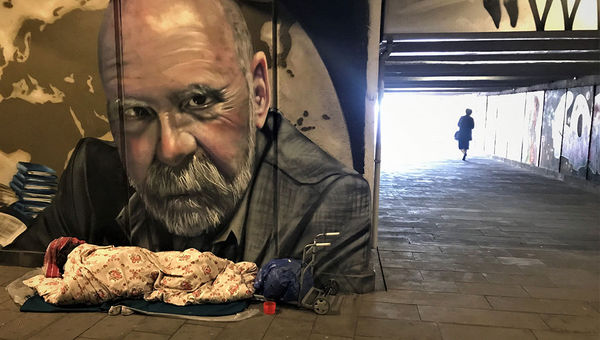
Homelessness in Tblisi was evident in passages below intersections. Photo Credit: TW photo by Arnie Weissmann
Perhaps it’s stating the obvious to say that societies are complex and that locals live in various strata of comfort and discomfort. I suspect that when most visitors say they want to live like a local, they are often aided and abetted by the travel industry, usually romanticizing the local they imagine they want to live like.

